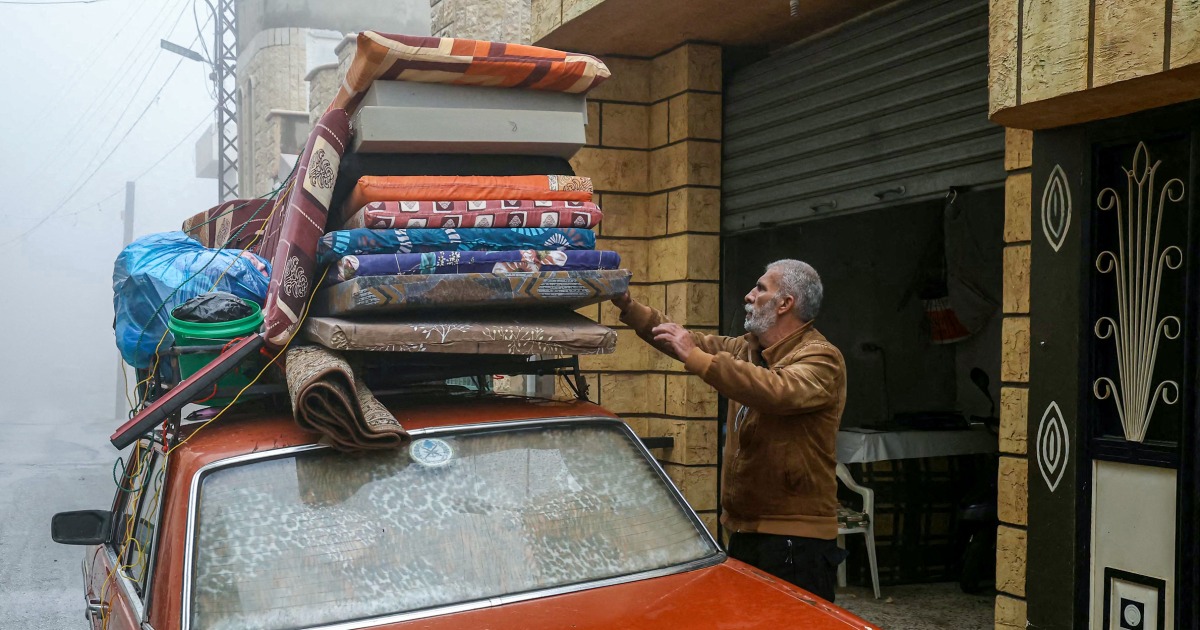
ZOUK MOSBEH, Lebanon — The crushing reality of homes and businesses reduced to crumbled cement and mangled steel has curdled the joy many in Lebanon felt after Israel and Hezbollah agreed a ceasefire earlier this week.
“I have no house. Now we’re looking in the village to rent one apartment,” Ali Eid, 56, told NBC News in a telephone interview Friday after returning to his hometown of Maarakah in southern Lebanon’s Tyre district.
“We, as many other people, are extremely happy to come back, but at the same time, I look at the people who lost their houses and their loved ones, it’s devastating,” added the high school teacher.
Eid was one of almost 1.2 million people displaced inside Lebanon as Israel and the Hezbollah militant group traded fire during almost 14 months of conflict that began the day after Hamas’ Oct. 7, 2023, terrorist attack in which about 1,200 people were killed and around 250 taken hostage, according to Israeli authorities.
Thousands of people displaced to northern Lebanon by the fighting have started to make their way back south as the fragile ceasefire negotiated by the United States continues to hold, despite Israel urging them to stay put.
Almost 3,500 people have been killed in Lebanon, according to officials in the country. In northern Israel, 60,000 people have been forced from their homes, with 80 soldiers and 50 civilians killed, according to local officials.
Imad Komayha is a political activist and writer who moved several times after leaving his home in the village of Kfarsir before he ended up in Lebanon’s north.
On his return, he said around 50 homes had been destroyed in the village, but his house was still standing. “Some shattered glass only, but around us, my neighbor’s house is on the ground.”
“I am happy, scared, in complete shock at the same time. People are in complete shock. Looking at the destruction is devastating,” said Komayha, 58, adding that he had been to the funerals of a mother, her daughter and her son-in-law shortly after he returned.
“We’re trying to do many tasks at the same time, cleaning the house, receiving neighbors, getting news from people who did not show up, asking about the casualties,” he said. “Let’s hope this will be our last displacement. It feels great to get back home,” he added.
Others like Elham Ezzeldine were less fortunate. After she returned from her brother’s house in Lebanon’s capital Beirut to her home in the southern city of Tyre, she estimated it would cost her at least $30,000 to repair it.
“I can’t describe to you the amount of damage,” the 51-year-old housewife said. “There are some areas and streets in Tyre that are on the ground. I don’t know how long it will take us to go back to our normal life and city. My husband is not working. He used to have a clothing store in Tyre, which was completely demolished.”
“I cry for Tyre, my beautiful city, I cry for the people who lost their loved ones and their houses,” she said. “I wonder what everybody gained from this damned war, except death and destruction,” she added.
After nearly a year of cross-border clashes in parallel with the Gaza war, Israel stepped up its air and ground campaign in Lebanon in September, while a large number of Hezbollah’s leaders were assassinated including its chief, Hassan Nasrallah.
In the village of Niha, Ali Alamine was also “angry” at the destruction. “I can’t describe my feelings, we lost many friends during the war, and I am devastated.”
Alamine, 52, said he “cried like a baby,” when he saw the destruction in nearby Dahiya, where his office is based. “Hearing the news is one thing and seeing the damage is another story,” he added.
While he counts the personal cost of the conflict, the cost of physical damage and economic losses for Lebanon will be around $8.5 billion, according to an estimate from the World Bank — a huge price for a country still suffering the effects of a financial collapse five years ago.
And while the truce was the first major sign of progress in the region since war began more than a year ago, it did not address the war in Gaza, where United Nations and aid officials say hunger and desperation are growing among the population, almost all of which relies on humanitarian aid to survive.
Meanwhile in Lebanon, Alamine and others are still taking stock of the devastation.
“I thank God that we lost material things only, but again it hurts so bad to see all this,” he said, adding: “Let’s hope that everything is over and that we can have a normal life again.”